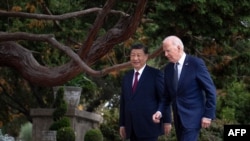Barely two weeks before a major United Nations conference on climate change, the United States and China have announced new agreements to work together on greenhouse gas emission reductions and the rollout of renewable sources of energy.
The deal, announced Tuesday ahead of a meeting between U.S. President Joe Biden and China's President Xi Jinping in California, commits both countries to further efforts to displace fossil fuels as the world's leading source of energy. It also marks the resumption of a bilateral working group on climate issues that was sidelined last year.
A summary of the agreement released Tuesday by the State Department said the two countries intend "to sufficiently accelerate renewable energy deployment in their respective economies through 2030 from 2020 levels so as to accelerate the substitution for coal, oil and gas generation."
The result, the agreement continued, will be "meaningful absolute power sector emission reduction, in this critical decade of the 2020s."
The agreement was released as world leaders are preparing to meet in the United Arab Emirates at the end of November for a United Nations-sponsored climate conference known as COP28. The annual gathering assesses progress being made toward a global effort to keep the increase in global average surface temperatures to no more than 1.5 degrees Celsius above pre-industrial levels.
Greenhouse gas focus
In an important breakthrough, the agreement indicates that China is prepared to commit to reductions in its emissions of all greenhouse gases, which trap heat in Earth's atmosphere, accelerating the rise in average global temperatures.
In the past, Beijing's greenhouse gas reduction pledges have applied only to carbon dioxide, leaving out several much more potent sources of global warming, including methane and nitrous oxide. The agreement does not set specific goals but commits both countries to negotiations meant to establish them.
The two countries also invited other world leaders to attend a Methane and Non-CO2 Greenhouse Gases Summit as part of COP28.
China has previously declined to join the Global Methane Pledge, under which nearly 150 countries and multilateral organizations have agreed to try to work to rapidly reduce emissions of the gas.
Talks restarted
The agreement on climate issues is a bright spot in a relationship that has been fractious in recent years. Previous talks between the U.S. and China were derailed in 2022 after then-Speaker of the House of Representatives Nancy Pelosi angered China by visiting Taiwan.
The agreement was steered to completion by the two countries' climate envoys, former U.S. Secretary of State John Kerry, and Xie Zhenhua, a former senior official in the Chinese government who came out of retirement to participate in the talks.
The agreement commits the U.S. and China to "recommence bilateral dialogues on energy policies and strategies, carry out exchanges on mutually agreed topics" and to take other steps to "enhance pragmatic cooperation."
That cooperation includes a promise to develop five large-scale cooperative carbon capture, utilization and storage projects each by 2030.
Critical conversations
Climate activists say they were relieved to see the U.S. and China come back to the negotiating table, particularly in advance of COP28.
"The most important thing here is that the two largest emitters are back to talking about the details around climate diplomacy," said Rachel Cleetus, policy director of the Union of Concerned Scientists' Climate and Energy Program. "It's critical. The world as a whole cannot meet its climate goals if the U.S. and China don't find a shared collective ambition."
Cleetus applauded the agreement's promises of progress on renewable energy production and emission cuts. However, she told VOA, she would have liked to see more progress on reducing the consumption of fossil fuels.
"Accelerating the pace of renewables is all well and good — it's very important for both the U.S. and China to do that," she said. "But both countries have a real fossil fuel problem. They're continuing to expand fossil fuels, even as they accelerate renewables. And as a net result, we're not going to see the kind of progress we need."
National Climate Assessment
The announcement of the agreement between the U.S. and China came just a day after the federal government released the fifth National Climate Assessment, a congressionally mandated assessment of the "impacts, risks and responses" to climate change in the U.S.
The report painted a grim picture, saying, "The effects of human-caused climate change are already far-reaching and worsening across every region of the United States."
Among other things, the assessment demonstrated that average annual temperatures have been on the rise across all 50 states, and that all coastal states have experienced significant sea level rises.
While the country has begun taking steps, including consistently reducing greenhouse gas emissions since their peak in 2007, the report found that much more needs to be done, and that the global nature of the problem means that the U.S. cannot solve the problem on its own.
"[W]ithout deeper cuts in global net greenhouse gas emissions and accelerated adaptation efforts," it said, "severe climate risks to the United States will continue to grow."




